Moment's Notice
Recent CDs Briefly Reviewed
by
Bill Shoemaker
Myles Boisen + Jon Raskin
Music + One: An Improvisation Compendium
Rastacan BRD 054
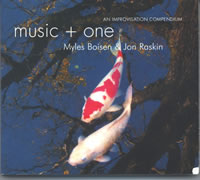 Playing along with records gets a bit of a bum rap, pedagogically. There are inherent shortcomings; it does not promote the type of anticipatory listening required of improvisers – at least not after the first spin – nor does it give a full sense of the collective nature of the endeavor. And, there’s something inescapably and painfully adolescent about it. But, if you’re stranded in Arkansas or Armenia, it’s one of very few ways to get started.
Playing along with records gets a bit of a bum rap, pedagogically. There are inherent shortcomings; it does not promote the type of anticipatory listening required of improvisers – at least not after the first spin – nor does it give a full sense of the collective nature of the endeavor. And, there’s something inescapably and painfully adolescent about it. But, if you’re stranded in Arkansas or Armenia, it’s one of very few ways to get started.
Myles Boisen and Jon Raskin address these issues very intelligently with Music + One. They validate the constituency who can benefit from a play-along regimen and give a clear explanation of how it articulates specific issues in free improvisation. And, Boisen and Raskin emphasize how the at-home player can transform the solo tracks laid down by the “pros,” an initial step in his or her empowerment.
The CD consists of 22 solo improvisations, mostly by Bay Area musicians, who were instructed to improvise for three to four minutes, and to improvise “as if you were playing music with your shadow,” which would “allow room for others to improvise with the recording.” The at-home player is encouraged to use any or all of seven approaches to improvising with the tracks, which span close listening and what was once called “playing apart.”
The interesting questions posed by this CD are whether or not there is a presumably crumb-sized segment of the gigantic US music education market receptive to Music + One, and whether or not Boisen, Raskin and Rastacan can access it, if they so desired. A booth at IAJE is probably not in order, but even music teachers at the elementary and secondary levels could make good use of Music + One.
Even if you’re not an instrumentalist, or are insufficiently uninhibited to bang along with a few pots and pans, the album is recommended for presenting the scope and qualities of improvised music in the Bay Area in an unlikely context. For consumers who need name checks, here’s a randomly selected half-dozen from the 22 participants: shakuhachi player Philip Gelb; electronicist Chris Brown; percussionist Gino Robair; guitarist John Shiurba; vocalist Aurora Josephson; bassist George Gremaschi.
Don Byron
Do The Boomerang: The Music Of Junior Walker
Blue Note 0946 3 41094 2 0
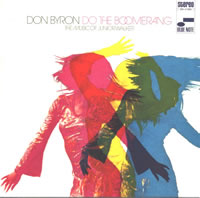 Junior Walker is as iconic a saxophonist as John Coltrane for basically the same reason: His music is elevating, automatic, guaranteed. Sure, he did within the context of a three-minute single, and his music was as corporeal as Coltrane’s was spiritual. Still, in general terms, it’s all soul music, and, on any given day, shaking a tail feather to “Roadrunner” is going jumpstart your qi faster than total immersion in “Meditations.” Don Byron gets this, which is why it was such a relief that he didn’t put a post-modern spin on Do The Boomerang. Byron’s boldest move is playing tenor sax for most of the album, even though his simmering clarinet on the title track and his fat bass clarinet sound on “What Does it Take” suggests that he could have made a go of it with the clarinets. Byron avoids Walker signatures like the pneumatic bray of “Shotgun” and his other chart-toppers. Additionally, Byron mines some of the B sides like “Cleo’s Mood” and “Tally Ho” that placed Walker’s shouting and hollering style closer to jazz-leaning R&B. Byron’s core band of guitarist David Gilmore, organist George Colligan, bassist Brad Jones and drummer Rodney Holmes simply cooks. Dean Bowman and Chris Thomas King ably split the vocal chores, and trombonist Curtis Fowlkes does Fred Wesley proud on Byron’s nod to James Brown, the Godfather’s “There It Is.” This is an album that would have blown up with one misstep into kitsch or mushy rhetoric. By sticking to the essentials of Walker’’s music, Byron makes an incisive ecumenical statement.
Junior Walker is as iconic a saxophonist as John Coltrane for basically the same reason: His music is elevating, automatic, guaranteed. Sure, he did within the context of a three-minute single, and his music was as corporeal as Coltrane’s was spiritual. Still, in general terms, it’s all soul music, and, on any given day, shaking a tail feather to “Roadrunner” is going jumpstart your qi faster than total immersion in “Meditations.” Don Byron gets this, which is why it was such a relief that he didn’t put a post-modern spin on Do The Boomerang. Byron’s boldest move is playing tenor sax for most of the album, even though his simmering clarinet on the title track and his fat bass clarinet sound on “What Does it Take” suggests that he could have made a go of it with the clarinets. Byron avoids Walker signatures like the pneumatic bray of “Shotgun” and his other chart-toppers. Additionally, Byron mines some of the B sides like “Cleo’s Mood” and “Tally Ho” that placed Walker’s shouting and hollering style closer to jazz-leaning R&B. Byron’s core band of guitarist David Gilmore, organist George Colligan, bassist Brad Jones and drummer Rodney Holmes simply cooks. Dean Bowman and Chris Thomas King ably split the vocal chores, and trombonist Curtis Fowlkes does Fred Wesley proud on Byron’s nod to James Brown, the Godfather’s “There It Is.” This is an album that would have blown up with one misstep into kitsch or mushy rhetoric. By sticking to the essentials of Walker’’s music, Byron makes an incisive ecumenical statement.
François Carrier + Dewey Redman + Michel Donato + Ron Séguin + Michel Lambert
Open Spaces
Spool Line 27
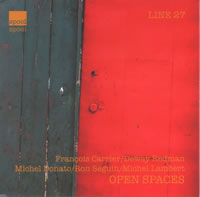 The time-honored tradition of an accomplished jazz artist traveling alone, hooking up with like-minded musicians far off the beaten path, and creating music that approaches or belongs in the first tier of the artist’s recordings, is alive and well on Open Spaces. Alto saxophonist François Carrier, drummer Michel Lambert and bassists Michel Donato and Ron Séguin (Donato plays on one track, Séguin on the other two) were more than ready for Dewey Redman on these 1999 performances, recorded live in Québec. They understood that the tenor titan needed little prompting – a pulse, a riff, a notion of a mood – to become engaged and quickly take the music upstairs. On “Going Through,” it is a plaintive Carrier line that Redman latches onto; on the title track, it’s a half-speed boppish phrase. Regardless of the starting point, Redman glides in when the music approaches a simmer, giving his cohorts a boost without saturating the music. Still, “With The Flow” is perhaps the most revealing track of the date. Redman and Séguin begin with a pensive dialogue that builds with the entries of Carrier and Lambert, culminating in an exciting, thoroughly collective statement. Therein lies Redman’s solution to the intrinsic proposition of these situations: How does an artist make an audience feel they have gotten a fulfilling, truly representative performance, while giving his collaborators full franchise? Keep it open; let it build; let everyone flag their flag at the summit. Generosity is not a prerequisite of greatness in jazz; but, it is a common trait among jazz’s greats, including Dewey Redman. This rewarding album is ample proof.
The time-honored tradition of an accomplished jazz artist traveling alone, hooking up with like-minded musicians far off the beaten path, and creating music that approaches or belongs in the first tier of the artist’s recordings, is alive and well on Open Spaces. Alto saxophonist François Carrier, drummer Michel Lambert and bassists Michel Donato and Ron Séguin (Donato plays on one track, Séguin on the other two) were more than ready for Dewey Redman on these 1999 performances, recorded live in Québec. They understood that the tenor titan needed little prompting – a pulse, a riff, a notion of a mood – to become engaged and quickly take the music upstairs. On “Going Through,” it is a plaintive Carrier line that Redman latches onto; on the title track, it’s a half-speed boppish phrase. Regardless of the starting point, Redman glides in when the music approaches a simmer, giving his cohorts a boost without saturating the music. Still, “With The Flow” is perhaps the most revealing track of the date. Redman and Séguin begin with a pensive dialogue that builds with the entries of Carrier and Lambert, culminating in an exciting, thoroughly collective statement. Therein lies Redman’s solution to the intrinsic proposition of these situations: How does an artist make an audience feel they have gotten a fulfilling, truly representative performance, while giving his collaborators full franchise? Keep it open; let it build; let everyone flag their flag at the summit. Generosity is not a prerequisite of greatness in jazz; but, it is a common trait among jazz’s greats, including Dewey Redman. This rewarding album is ample proof.
Nels Cline
New Monastery: A View Into The Music Of Andrew Hill
Cryptogramophone
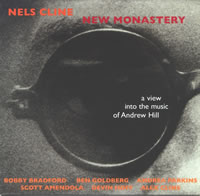 With New Monastery, Nels Cline elevates the proposition of jazz repertoire from preservation to making the case for its ongoing relevancy in the post-jazz future. This endeavor is aided by the guitarist’s characterization of the project as a view into the music of Andrew Hill, a living artist who is often crammed into a historical context that doesn’t really provide a good fit for the formal properties and temperament of his music.
With New Monastery, Nels Cline elevates the proposition of jazz repertoire from preservation to making the case for its ongoing relevancy in the post-jazz future. This endeavor is aided by the guitarist’s characterization of the project as a view into the music of Andrew Hill, a living artist who is often crammed into a historical context that doesn’t really provide a good fit for the formal properties and temperament of his music.
Yet, history does play into Cline’s choices of cohorts in intriguing ways. Trumpeter Bobby Bradford is a contemporary of the pianist’s, albeit one on the other side of the continent, when such distances were far more determinative of the evolution of the music than it is now. Other members of his ensemble have specific relationships with other luminaries of Hill’s generation: clarinetist Ben Goldberg was mentored by Steve Lacy; and, according to Julius Hemphill, percussionist Alex Cline was one of only two players who immediately nailed the 11/8 of “The Hard Blues.” Still, Andrea Parkins’ accordion and effects (and the leader’s guitar and electronics, occasionally) speak an early 21st Century dialect, one that seconds the notion that it’s no longer about notes. And, bassist Devon Hoff and drummer Scott Amendola are stalwarts of a transgenre improvising aesthetic.
It’s one thing to attract new listeners with a contemporary sound; it’s another to also impress long-time listeners with a high level of connoisseurship. Cline meets that test largely with his use of medleys, leading off the album by a high-energy pairing of “McNeil Island“ and “Pumpkin,” and creating an absorbing high-contrast sequence with “No Doubt / 11/8 / Dance With Death.” To turn material inside out, you have to know it inside out, and Cline repeatedly proves this, whether he is sharpening the incessant edge of “Compulsion” or the sly groove of “The Rumproller.”
Often, an exceptional recording will create a new audience for an artist. New Monastery may very well do this for two artists – Nels Cline and Andrew Hill.
Ornette Coleman
Sound Grammar
Sound Grammar SG11593
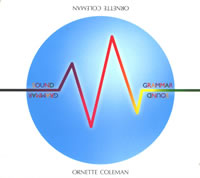 Ornette Coleman explains sound grammar more directly in his publicist’s press release than in his cover notes: “Sound grammar is to music what letters are to language. Music is a language of sounds that transforms all human language.” Even though letters are the stuff of written language, and the meaning of any number of letter groupings can have widely different meanings when spoken or written, we know what Ornette means, approximately.
Ornette Coleman explains sound grammar more directly in his publicist’s press release than in his cover notes: “Sound grammar is to music what letters are to language. Music is a language of sounds that transforms all human language.” Even though letters are the stuff of written language, and the meaning of any number of letter groupings can have widely different meanings when spoken or written, we know what Ornette means, approximately.
In a way, Ornette’s art lies in his ability to communicate using approximate syntax. There have always been approximations of blues and bebop in his music, confirmed by his vigorous reprises of “Turnaround” and “Song X.” Ornette’s spin on folk forms retains its pluck on the Mexican-tinged “Matador.” Beginning with “Bach Prelude” on 1992’s Tone Dialing (Harmolodic/Verve), Coleman began an overt examination of classical repertoire that is extended on the lovely “Sleep Talking,” which is built upon the opening phrase of “The Rite of Spring.” Regardless of the lexicon he triangulates, however, every utterance on Sound Grammar is pure Ornette.
Recorded at a 2005 concert in Germany, the album also marks the recorded debut of Coleman’s two-bass quartet with Greg Cohen and Tony Falanga. It is perhaps his most important ensemble since the original Prime Time, since the new quartet provides a clearer separation of Ornette’s pungent lines from the dense weave supplied by the bassists and the impressively propulsive drumming of Denardo Coleman. Whereas Prime Time’s massive sound intensified Ornette’s cry and sharpened the edge of his phrases, the new quartet accentuates the soaring quality of Ornette’s alto. Often, Ornette’s solos are like the shock of strong color that hover over the darker masses on a Rothko canvas, whether he is playing alto, trumpet or violin.
